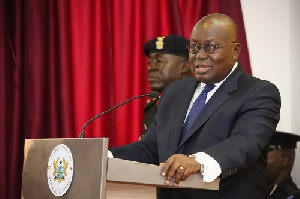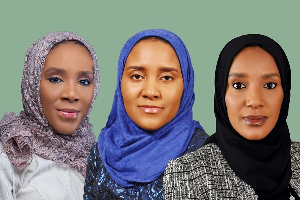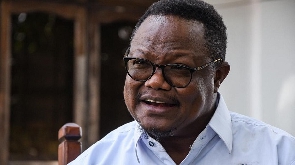The Government would consider the introduction of non-custodial sentences that use community service programmes to reform petty, crime offenders.
President Nana Addo Dankwa Akufo-Addo, who announced this, said the reforms would serve the dual purpose of providing the appropriate punishment for an offence, while getting some public good out of the service that would be required of the convict.
"My government will closely consider these, and all the other proposals that have been advocated for years, and fashion out a policy framework that will lead to the complete overhaul and reformation of the criminal justice system of Ghana," President Akufo-Addo stated.
He said the remand prisoner problem, for instance, had bedeviled the administration of justice for far too long, therefore, a decisive action had to be taken to end that vicious cycle once and for all.
President Akufo-Addo made these remarks, in a speech read on his behalf by Dr Matthew Opoku Prempeh, the Education Minister, at the opening of a two-day conference of the Faculty of Law of the University of Professional Studies, Accra (UPSA).
It was organised as part of activities marking Ghana's 60th Independence anniversary on the theme "Ghana @ 60: Evolution of Law, Democratic Governance, Human Rights and Future Prospects".
President Akufo-Addo said: "Another area of our law over which we must all bow our heads in collective shame, is our failure to hold public office holders to account, especially as it relates to corruption".
"Corruption, undoubtedly, therefore, remains the bane of the economic development and progress of our nation."
The President said the proliferation of corrupt public officials for example, had severely weakened the legitimacy, effectiveness and efficiency of State institutions, and most importantly destroyed the trust relationship that must exist between the government and the people.
"It is not surprising, therefore, that Ghanaians are increasingly distrustful of government and state institutions," he said.
Sadly, President Akufo-Addo noted, corruption was merely categorised as a misdemeanour by virtue of section 239 of the Criminal Offence Act, 1960 (Act 29).
"As I have always noted, and I will reiterate here - public service is just what its name suggests: ‘public service.’ It is, therefore, not a place for one to illegally enrich one's self at the expense of the country, and my government will not tolerate or countenance such criminal conduct from public office holders,” the President said.
He explained that in that regard, the Legislative Reform Agenda of the Government included the amendment of section 239 of Act 29, to make corruption and other related offences a felony, rather than the mere misdemeanour, that it currently was.
He said the seriousness of corruption and its devastating impact on the country, its economy and its future prosperity, also warranted institutional reform in addition to the aforementioned legislative reform if corruption was to be fully eliminated from the national fabric.
He said it was the intention of the Government to establish an Office of The Special Prosecutor (OSP), which would be truly independent, and break the monopoly of the prosecutorial authority currently being exercised by the Attorney-General.
"The OSP will, therefore, be responsible for initiating, investigating and prosecuting cases of, corruption involving public office holders, breaches of the Public Procurement Act, and the Financial Administration Act,” he explained.
"It is my fervent belief that, such a move will play no small part in vigorously fighting corruption; because it is incumbent upon us and imperative that we root out corruption in this country by nipping it in the bud once and for all."
Professor Abednego Okoe Feehi Amartey, the Vice Chancellor of the UPSA, said the Government's Free Education Scheme, which would start from the 2017/2018 Academic Year was laudable.
He, however, cautioned, saying that: "As operators in the tertiary education sector, we need to be informed of the concomitant increase in access to secondary education due to the free education translating to increased demand for quality tertiary education in our universities within a few years".
"We, as a university, are appealing to government to consider the potential upsurge of demand for quality university education in the foreseeable future and increase financial and technical support to Ghanaian public universities for capacity development in readiness."
Prof Kwame Frimpong, the Dean, Faculty of Law, UPSA, said over the past 60 years, ‘our shortcomings as a nation, outweigh our achievements;’ and attributed this to indiscipline.
General News of Friday, 10 March 2017
Source: ghananewsagency.org













